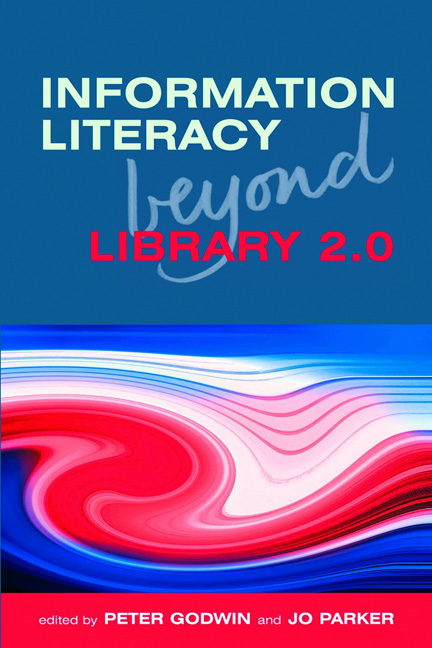Book contents
- Frontmatter
- Contents
- Contributors
- Acknowledgements
- Introduction
- PART 1 RECENT DEVELOPMENTS IN INFORMATION LITERACY AND LIBRARY 2.0
- 1 Library 2.0: a retrospective
- 2 Information literacy and Library 2.0: an update
- 3 The story so far: progress in Web 2.0 and information literacy
- 4 The changing web: sites to social
- 5 Web 2.0: from information literacy to transliteracy
- 6 Informed learning in online environments: supporting the higher education curriculum beyond Web 2.0
- PART 2 CASE STUDIES
- PART 3 WHAT IT MEANS FOR INFORMATION PROFESSIONALS
- Index
4 - The changing web: sites to social
from PART 1 - RECENT DEVELOPMENTS IN INFORMATION LITERACY AND LIBRARY 2.0
Published online by Cambridge University Press: 09 June 2018
- Frontmatter
- Contents
- Contributors
- Acknowledgements
- Introduction
- PART 1 RECENT DEVELOPMENTS IN INFORMATION LITERACY AND LIBRARY 2.0
- 1 Library 2.0: a retrospective
- 2 Information literacy and Library 2.0: an update
- 3 The story so far: progress in Web 2.0 and information literacy
- 4 The changing web: sites to social
- 5 Web 2.0: from information literacy to transliteracy
- 6 Informed learning in online environments: supporting the higher education curriculum beyond Web 2.0
- PART 2 CASE STUDIES
- PART 3 WHAT IT MEANS FOR INFORMATION PROFESSIONALS
- Index
Summary
Introduction
We would all agree that the internet is in a constant state of change. There are, however, many different types of change that we can observe. For example, there is the very crude measurement of the number of hours of YouTube video posted every minute, the number of tweets per second and the number of blogs that are created. These figures are generally quite mind boggling, but because they are available in easy, bite-sized chunks they are easy to digest and understand.
What are rather less easy to understand, however, or indeed to know, are some of the longer-term changes in trends that influence the growth and change of the internet. We could, for example, consider the way in which the internet has become more of a medium for the creator than for the consumer; or the extent to which newspaper publishing has moved onto the net at the expense of the more traditional printed format; or the way in which various groups or indeed societies are able to change both politically and socially. What is of particular interest to the information professional, however, is the slow but sure way in which the whole process of internet search is moving away from the institutional and towards the individual. This is of course part and parcel of the increasing importance of the information creator and needs to be considered within that context.
Issues of personalization
Search engines have always had as their Holy Grail the ability to tailor their results directly to the individual's needs. Once they are able to do that they can also much more closely tailor the adverts that they present to individual users, and thus make more money for themselves. Until now it has been almost impossible to achieve this except in the very broadest sense. Search engines have had to rely on what sites people click on and the links to those sites. With the rising volume of individual data flooding onto the net, however, search engines can now start to become much more precise in the way in which they tailor their information. Let's assume a really basic example. Suppose that you are interested in finding out about librarians.
- Type
- Chapter
- Information
- Information Literacy Beyond Library 2.0 , pp. 41 - 52Publisher: FacetPrint publication year: 2012



